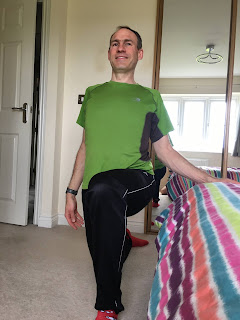Hi,
I mentioned in a recent post that I had updated my stretching routine recently. The pictures below show all of my current stretches, in the order that I do them:
Hamstring
I start with hamstrings - I have always tried to touch my toes as a measure of if the stretch makes any difference. Back in 2018 I noted that some days I can touch my toes and other days I cant. These days it is much more that I cannot touch my toes at all. I do each leg twice, each stretch for about 20-30s.
Adductor
As noted in 2018, I focus on keeping each leg as straight as possible, and my body upright. This is a tricky position to get into this position, and I am often use the wall to help, probably more so than in 2018. I do each leg for 20-30s.
Calfs
This is a stretch in 2 parts, in each case trying to keep feet flat on the ground, legs straight and in line with my body. For the second one I each leg, each of the three stretches are 20-30s long.
Calfs and Adductors
These two stretches finish off my calf and adductor stretches, and the second gets me extension in my chest. I hold each for some 20-30s.
Sitting Cross-legged
This is a new one. I realised that I had written quite a long time ago that I found sitting cross-legged uncomfortable as a child. I had generally avoided sitting cross-legged since then because of this discomfort. I sit like this for 20-30s, then swap my legs over and repeat the other way round. I concentrate on getting me knees lower. I added this after I added the next one, but do these first!
Perhaps over time I'll see if I can do this without leaning against something!
Cobblers Pose
This is a yoga pose as recommended by the German Geh(n)-mit-HSP study. Again, they show this without leaning against something. I concentrate on getting my knees down, and hold this for some 20-30s. You can see details here: https://www.treathsp.net/klinik/physiotherapie/uebungen
Hip Flexors
This stretch is a change from the way I did this in 2018, as I now do this like a forward lunge, but my knee is on the ground. I concentrate on pushing my hips forward to get the stretch, and do each side for some 20-30s.
Abdominal Stretch
These two stretches are new, and they were recommended in the German Geh(n)-mit-HSP study. I hold each for about 20-30s.
I think that I have noticed a difference with these stretches. I have found that my spine is more mobile in some Pilates exercises. Previously when lifting or lowering into/from a bridge position my spine was very blocky, and now I can feel more vertebrae individually.
I became aware of these in Jan 2021, so it has taken me some 4 months of doing these to notice the difference in my spines flexibility.
Plank
Adding the plank after the ab stretches was a straightforward thing to do, and I hold this for some 20-30s, just to help my core strength.
Roll-downs
I finish with three roll-downs from Pilates, just to help with my spine articulation and general flexibility. I concentrate on flexing my ribcage, and as per 2018 my legs stay slightly bent throughout.
Overall Timing
So, there are more stretches here than there were in 2018. I still mentally count each stretch rather than use a timer. I do these stretches once a day, usually not long after I get out of bed, which differs from 2018 when I would do one set in the morning and another set in the evening. The total time for all stretches is typically 17 minutes (as measured with FitBit). I can get these all done in a little over 15 minutes if I rush, and some days it will be getting on for 20 minutes by the time I finish. The overall time doing stretches per day is similar to that from 2018. Now that I only do one set per day I am more rigorous about ensuring that I do these, so only a handful of days with no stretches, most often if I am away.
If you would like to compare these with the same from 2018 - see here: https://hspjourney.blogspot.com/2018/04/stretching-routine.html
You can also read about the German project here: https://hspjourney.blogspot.com/2021/01/which-physiotherapy-helps-with-hsp.html
I also wrote recently about why we do stretches here: https://hspjourney.blogspot.com/2020/05/why-do-stretches.html












